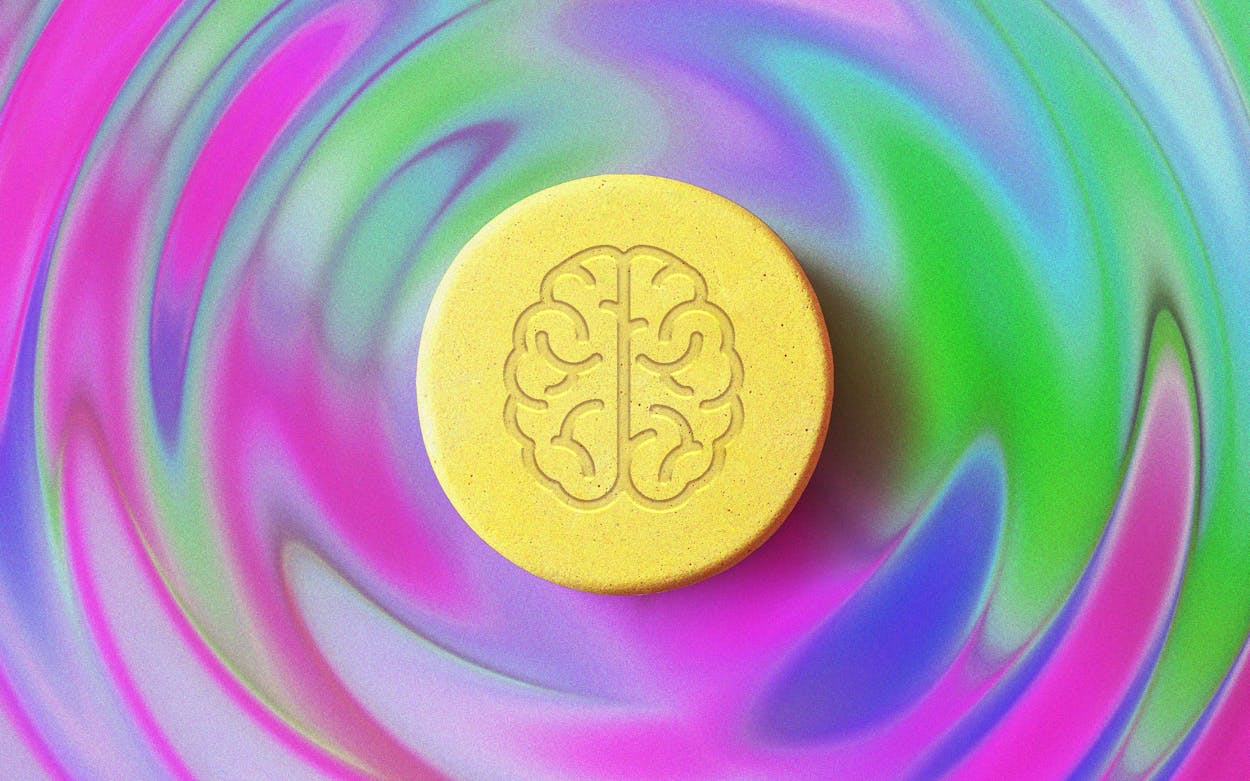On the day it opened in early May, Field Trip Health’s therapeutic facility in Houston’s uptown neighborhood looked a little like a high-end strip-mall spa. Dressed in a floral shirt, Matt Emmer, the company’s director of operations and business development, showed me the clinic’s amenities. He led me down a hallway, around a narrow Zen rock garden, past eight therapy rooms with white-leather zero-gravity chairs and headphones, and into a spacious, sunlight-filled gathering area outfitted with gray couches and a plush white carpet. A few light pink, brown, and gray pillows and throw blankets were scattered about. He sat down on the couch and asked, “Are you familiar with psychedelics?”
Field Trip, which launched in 2019 in Toronto and began opening clinics across North America in 2020, offers patients what is currently the only psychedelic drug with Food and Drug Administration approval for prescription: the anesthetic ketamine. After an initial screening with a psychiatrist to ensure safety, patients here are paired with a psychotherapist to begin four to six sessions with the drug. They take it as a lozenge, which induces an hour-long dissociative episode (a therapist is always in the room and a nurse in the hallway, should patients require medical intervention), after which they have an hour of follow-up therapy. “Settled into the treatment room, we actually use weighted blankets, reclining chairs, curated playlists, and eyeshades,” Emmer said.
The uptown Houston clinic is Field Trip’s first in Texas. But it is by no means the only facility in the state offering ketamine. The antidepressant effects of the drug, which has FDA approval as an anesthetic, have been researched since the seventies, and a nasal-spray form of the drug was approved for the treatment of depression in 2019. Many clinics in Texas use other forms of the drug off-label for psychiatric therapy. The Texas Medical Board doesn’t keep data on the number of therapeutic facilities offering ketamine treatment, but more than a dozen clinics have opened in the past half decade in many of Texas’s largest cities, where patient interest has grown substantially. Though therapy isn’t cheap and often isn’t covered by insurers—six sessions of ketamine can cost around $6,000 out of pocket—studies have found it is effective at combatting treatment-resistant depression.
But ketamine is probably not the endgame for all these clinics—and it certainly isn’t for Field Trip. Based on the growing body of evidence, researchers predict the FDA will approve MDMA (ecstasy, a synthetic drug) for the treatment of PTSD by 2023 and psilocybin (the compound in “magic mushrooms”) for depression by 2025. Emmer is very much a businessman with an eye on those future prospects. “We can provide ketamine-assisted psychotherapy in these centers right now in order to build the infrastructure,” he said. “So when MDMA is available, that’s almost like another item that’s on the treatment menu. [When psilocybin becomes available], psilocybin is on the menu.”
Soon, it appears, Texas will add to research into psychedelics that facilities such as Field Trip could use. This legislative session, Brownsville Democrat Alex Dominguez authored a bill in the Texas House that would fund research on psilocybin for treatment-resistant PTSD in veterans, as well as a literature review of the existing studies on ketamine and MDMA’s use in treatment of the disorder. Noting that some veterans have been on lengthy waiting lists to receive psychedelic therapy treatment in Mexico, Dominguez believes Texas should begin to explore the efficacy of such treatment in the States. “It’s a terrible situation to have to admit that our veterans have to go to another country to receive treatment for something that we should be taking responsibility for,” he said.
Dominguez told me that he met with several researchers who have had some success with ketamine in treating veterans with PTSD but that many believe that they get better results with psychedelics that are still awaiting phase three trials and FDA approval. In studies, MDMA has been shown to be particularly effective for the treatment for PTSD, but, Dominguez says, many veterans hesitated to use synthetic drugs and voiced a preference for a natural substance: hence psilocybin.
Lynnette Averill, a clinical neuroscientist who studies PTSD and suicidality in veterans at Yale University and Baylor College of Medicine and consulted with Dominguez on the bill, told me that most research on psilocybin has been on its use in treating depression. Studying its potential for treating PTSD would be a landmark effort that hasn’t happened to date, she said.
Various doctors and veterans testified in support of the bill, as did former governor Rick Perry, who came to the Capitol to advocate for its passage, even while identifying himself as a “very anti-drug person.” No one testified against it at a hearing in April. In early May, the House passed Dominguez’s bill on a 134–12 vote, and it now awaits a vote in the Senate.
Exactly what psychological treatment with psychedelics will look like in the U.S. in a few years remains to be seen. Groundbreaking research from the Johns Hopkins Center for Psychedelic and Consciousness Research and at the San Jose, California–based Multidisciplinary Association for Psychedelic Studies has received considerable attention in recent years. Michael Pollan’s 2018 best-selling book How to Change Your Mind also raised the profile of psychedelics as a form of mental health treatment.
But because the therapy is relatively new, even enthusiasts are treading cautiously. As Emmer walked me out the door in Houston, he said, “I think it’s important to understand that it’s not like [these drugs] offer a magic bullet. It’s not like you just take some ketamine and you take some magic mushrooms and that’s it.” He grew intent on this point. “I think people have these tremendous transformative experiences. But a lot of it is the preparation, the safety, the support doing it in this very responsible, controlled manner.”
- More About:
- Health
- Texas Legislature
- Houston








